- Home
- Jack Hardin
The Apostate
The Apostate Read online
The Apostate
An Ellie O’Conner / TEAM 99 Novella #2
Jack Hardin
First Published in the United States by The Salty Mangrove Press
Copyright © 2019 by Jack Hardin. All rights reserved.
This is a work of fiction. Names, characters, businesses, places, events, locales, and incidents are either the products of the author’s imagination or used in a fictitious manner. Any resemblance to actual persons, living or dead, or actual events is purely coincidental.
No part of this book may be reproduced in any form or by any electronic or mechanical means, including information storage and retrieval systems, without written permission from the author, except for the use of brief quotations in a book review.
Contents
TEAM 99
Chapter 1
Chapter 2
Chapter 3
Chapter 4
Chapter 5
Chapter 6
Chapter 7
Chapter 8
Chapter 9
Chapter 10
Chapter 11
New to Jack Hardin?
Leave a Review
TEAM 99
TEAM 99 is:
Mortimer - Team Director
Voltaire (Brian Carter) - Team Leader
Pascal (Ellie O’Conner)
Faraday (Sarah Cornish)
Virgil (Ethan Bradford)
Cicero
Dante
Darwin
Chapter One
Amman, Jordan
Amir’s hands were sweating. He rubbed them down the side of his jeans and looked over at Hassan. His friend did not look nervous. Hassan's disposition was calm, almost serene, with no hint of anxiety. Armir knew that the awful feeling of despair in the pit of his stomach did not mean that he was any less committed to their cause, and yet he had been unable to will it away.
Hassan stood up from the cafe table and tossed down a twenty dinar bill. Amir stood with him and followed him down the sidewalk where two white Mitsubishi Pajeros were parked next to the curb. Hassan dug two sets of keys from his pocket and handed one to Amir. He set his free hand on Amir’s shoulder. “It will be over soon,” he said.
“Yes, it will.”
“We must go.” Amir nodded but didn’t move. He stared blankly down the street. “Amir.”
Amir blinked and nodded. “Yes. Yes—I am ready.”
“Good.” Hassan stepped into the street, opened his door, and slipped in behind the wheel. Amir got into the driver’s seat of the second car and followed Hassan as he accelerated and merged into traffic.
It was just after one o’clock in the afternoon, and the sun beat down hard on the dry city, its rays reflecting brightly off cars windshields and windows. Hassan drove down Al-Hashemeyin Street for two kilometers before turning left onto Al-Umawyeen Street where traffick quickly thinned out. The air conditioner did not work in Amir’s car. He rolled down the windows to generate a cross breeze and swallowed hard against a dry throat. Hassan slowed and Amir switched lanes and pulled up next to him. Hassan’s window was down as well. He smiled at his friend. “God be with you,” he called out.
“And God be with you, Hassan.”
With that, Hassan continued down the road, turning a hundred meters later into the multi-lane entrance of the embassy of the United States. Amir pulled to the curb and waited. He rubbed his mouth with his fingers and nervously tapped the steering wheel. He took a deep breath and tried to push back a wave of nausea that threatened to bring up his final lunch.
He noted the time on his wristwatch. It had already been two minutes. It was too long; it should have been done by now. What was taking so long? He rubbed at his mouth again just at the explosion erupted. It was loud—far louder than he anticipated—and the concussive effects hurled towards him, buffeting the air. The car rocked on its tires and Amir looked up to witness the beginning of a dark gray mushroom cloud begin to develop.
That was his que. His ears were ringing, but he remained focused and pulled back into the road and around two cars that had come to a stop. Panicked and confused drivers were already stepping out of their vehicles and Amir had to swerve to miss one that walked mindlessly in front of him. Amir pulled in were Hassan had turned minutes before. The scene before him caused him to press his brakes. He had passed by here many times over the last several weeks. He had studied pictures of the complex; memorizing every building, structure, and defensive deterrent.
But now he recognized nothing at the front of the complex.
The guardhouse was no longer there. Only the blackened chassis of Hassan’s car remained. The black and white striped concrete barriers had been blown apart and now only small fragments of their bases stood at angles among the rubble. The front of the administration building, where travelers applied for visas—was completely ripped away. Above, white papers fell from the sky like wounded butterflies.
Amir accelerated forward. His adrenaline was running high, making his arms tingle and pushing back any fear he felt just minutes earlier. The car’s tires flopped over what was left of a door and then a chunk of concrete. Amir slammed on the brakes when the rubble became too congested for him to advance any further. He reached down and pulled up on the trunk release, flung his door open and and hurried to the back of the vehicle.
Behind him, he could hear locals yelling out from the street. Before him he could hear agonizing screams of wounded and terrified Americans. He opened the trunk and peered inside. A large black canvas bag was the only item inside, detonator sitting on top. Amir grabbed the plastic remote and flipped the switch upward. He breathing sudden accelerated and he quickened his pace. He grabbed the strap of the bag and slung it across his shoulder. It was heavy, but he bent his knees and bore up beneath the weight. He looked down at the remote in his hand. The diode was green. A red bottom was on top. He jammed his thumb into it and left it there.
Leaving the trunk open he stepped away from the car and advanced into the complex. The main building a series of interconnect structures made out of sand color brick rose three and four stories tall. They had been untouched by Hassan’s bmob. His friend’s efforts had only cleared the way for him to get into the heart of the American complex.
He moved around the heart of the blast site, where a shallow crater, five meters wide was still burning. Amir stayed lowed as he crossed the grass, now littered with paper, chunks of brick, glass, and a charred leg, severed at the knee. The foot was still encased in a black combat boot. One of the American guards.
Amir knew a little English and he heard authoritative yells from up ahead. He didn’t have much time. From out in front of him someone yell for him to stop; but he skirted around a palm tree and continued forward.
He heard another scream from behind him. It was the last thing he ever heard. On the compound’s rooftop, twenty meters ahead, a soldier had him at the other end of a Barrett M82 rifle. The soldier pressed the trigger and Amir’s head evaporated. His body jerked and fell backwards and he last physical act of Amir’s life happened without his knowledge: his thumb came off the red button, sending a signal to the detonator.
The blast was immense; larger than the first one two minutes earlier. Thirty pounds of Semtex erupted at 8500 meters per second; a blast that would soon be heard around the world.
There would be no need for a video to be sent to Al Jazeera broadcasting a claim of responsibility for the attacks. As the blast settled, hundreds of small pin buttons lay strewn across the embassy’s complex. Most were tiny pieces of unrecognizable aluminum. But some were still in tact. They held a circular picture of a burning American flag. Printed over the picture in large block letters was the name of the one taking credit for the attack:
“The Apostate.”
Chapter Two
El-Hara, Egypt
“Here, hold that.” Ben Warner slid the needle out and pressed a piece of folded gauze over the insertion point. He tore a strip of medical tape off the dispenser and Paolo, his nurse, pulled his finger away as the tape was stretched across the lady’s arm.
Ben handed Paolo the syringe and leaned down, raising his voice to the dark, ancient lady sitting before him. Her faced was seamed with a hundred hard lines wrought by a lifetime of hard outdoor work and, mostly recently, life in a refugee camp, hundreds of miles away from her native Sudan. “Paolo will finish taking care of you. I have to go.”
She offered a toothless smile and nodded her thanks.
Paolo, an Italian relief worker with the United Nations, had been here for three months now. The Dunwharte refugee camp, compared with other such camps in Chad and Kenya, was small, providing food and shelter to less than fifteen thousand inhabitants, all of them displaced by the recent tribal wars and political unrest in their native Sudan, whose northern border lay over one thousand kilometers to the south. Ben had taken three weeks off from his family medical practice in Boston to come and volunteer his time for much-needed care to these desituate refugees.
Paolo discarded the syringe and slipped off his gloves. “Doctor Warner,” he said. “Thank you for all your help. We are most grateful.” He extended a hand and Ben shook it firmly.
“I hope our paths cross again someday,” Ben said.
“As do I. If you ever find yourself in Italy, come see me. We have plenty of room at our home.”
“I would like that.”
“Please,” Paolo said, “have a safe and restful trip back to America.”
Bent grabbed his only suitcase from the corner of the tent and stepped out into the bright sunlight. He plucked his sunglasses from his shirt pocket and put them on. It was early afternoon in the camp, and quiet this time of day. It was too hot even for children to come out and play. Thousand of white and brown tents filled the landscaped, providing much-desired shade from the unrelenting African sun.
A late-model Toyota Corolla sat idling in front of Ben. He leaned down and waved to get the driver’s attention. The side window came down. “Cairo?” he asked.
The driver removed the cigarette from his lips and nodded. “Yes.”
Ben motioned to the rear of the vehicle. “Can you open the back?”
The driver leaned down and pulled the latch that opened the trunk. It popped open and Ben tossed in his suitcase, shut it, and got into the rear passenger seat. “Hello,” he said, but it was only answered by a half-hearted grunt as the driver slowly accelerated down the long row of tents. He turned right at the perimeter fence and followed it until they came to the front checkpoint. Ben waved to the guard as they left the camp and merged onto the Al Wahat Al Baharia Highway. It was a four hour ride back to Cairo, with almost nothing in between but an infinite flat landscape of desert sands and blazing heat.
The driver flicked his cigarette out the window and rolled his window back up. The older man who had picked him up from Cairo International Airport had talked nearly non-stop on the ride to the refugee camp. Ben had learned all about the man’s family history in the country and his thoughts on the imminent revolution looming on the horizon. Ben been in country for fifteen days now. His plan was to stay for another seven, but the U.S. had issued an update travel alert, changing it from orange to red and advising all Americans in Egypt to leave immediately. That was two days ago now, and after repeated pleas from his wife to return stateside and a direct email from the U.S. Embassy in Cairo, Ben had reluctantly decided to return home.
Ben ...In an effort to be polite, Ben asked his driver, “Are you having a good day?” The driver nodded but offered no verbal answer. Okay, Ben thought, and decided that the ride was going to be a quiet one. That was alright by him. Working in a refugee camp for two weeks had been emotional trying. He was tired. Three children under the age of five had died under his care; there was nothing he could do for them. They had arrived with a caravan, having fled with their families from their war-ravished communities in Sudan. But the children were too malnourished, already stepping across death’s threshold, too far gone for him to save them.
Ben closed his eyes and lay his head back on the headrest. He took in a deep breath and sighed. He was glad he had come. Even in the middle of the Egyptian political turmoil. Half the Arab world, it seemed was on the brink of some sort of revolution. He read online yesterday where a journalist had taken to calling it the Arab Spring.
Ben leaned his shoulder against the door and got comfortable for the lengthy, silent drive. Within several minutes he was asleep.
When he opened his eyes some time later the sun was a little lower in the sky and the car had begun to slow. He looked out the window. They were still in the middle of nowhere. He sat up and leaned forward.
“Is everything all right?” he asked.
The driver didn’t answer. Up ahead, sitting just off the road, was a mud hut with a wooden lean-to. It was the only man-made structure Ben saw. The driver turned off and pulled beneath it. It wasn’t a gas station. It looked more like a deserted home from the nomadic era. Ben felt a shiver run through his stomach. Something about the situation wasn’t right. “Hey!” he snapped. “I asked you what's going on? What are we doing here?”
The driver opened his door and stepped out. He quickly walked to the front of the car and disappeared around the corner of the hut. Ben’s heart was racing now. Something was very wrong and he found himself wishing that he had taken Paolo up on his offer to drive him back to the airport. Ben was reaching for his door handle when it flung open and strong hands grabbed his arm and yanked him from the car. He fell sprawling into the hot sand and his sunglass flew off his face. He heard a shuffle beside him and looked up, squinting in the bright sunlight. A man wearing a white dishdasha—a middle eastern robe—was standing over him, clutching a wooden stock, semi-automatic rifle. He started yelling at Ben in furiously Arabic as two additional men with guns materialized. All three wore black shemagh scarves wrapped across their faces.
Ben’s hands were shaking as he pressed them into the dirt and tried to get up. Fine desert sand now clung to the sweat on his face. One of the men stepped in behind him, grabbed him, and yanked him back, forcing him to his knees. The first man leveled his the muzzle of his weapon down at Ben’s face and started yelling again. “Please. Please—no,” he yelled, and raise his hands in an instinctive attempt to protect himself but they were quickly grabbed and jerked hard behind his back. He felt something wrap around his wrists followed by the distinct zip of a zip tie being tightened. The men barked something at each other and Ben was forcefully brought to his feet. “What—what are you want?” he asked frantically. His gaze whipped back and forth between his accosters. Suddenly, the bright sunlight vanished as a dark hood was slipped over his head. “No! No!” He felt his feet lift off the ground as he was picked up by two men and carried away. “Please!” he screamed. “What do you want?”
His cried were ignored and the next thing he felt was the hard metal surface of the back of the van he was thrown into. He heard both men scrambled in behind him and sit beside him as the double doors were slammed shut. The vehicle started up and Ben lay still as it pulled away.
Beneath the hood sweat trickled into his eye and he tried blinking the sting away. He could smell his captors: foul sweat and the musty scent of cigarette smoke. Ben tried to steady his breathing in a futile attempt to gain control over a terrified imagination.
He had heard and seen enough of these scenarios over the last decade. And he knew that were was a good chance over the next several days that his wife would be watching a video of his beheading.
Chapter Three
Cairo, Egypt
Nine Hours Later
Gamal al-Banna held his cigarette loosely between his lips and plunged his fryer scoop into the pot of hot olive oil. When he pulled the scoop out it was loaded with perfec
tly cooked falafel. He tossed the small patties into a bowl and repeated the motion until the pot was empty. Setting the scoop down he turned off the heat on the burner and walked over to the refrigerator and grabbed several bunches of parsley. He tossed them on a cutting block and started to chop them with the expert skill of a man who had run the same restaurant and an unchanged menu for nearly thirty years.
Hashset Sumaya was a favorite lunch spot deep in the heart of Old Cairo, the bustling section of Egypt's capital whose presence dated back over one thousand years. Gamal was only twenty-seven when his uncle helped front some of the money to get the small eatery up and running. Business struggled along the first few years, but eventually he made it work. Each morning he arrived before five o’clock and didn’t shut the place down until after ten at night. The hours were long, the work hot, the bills many, but he loved it. He was good at it.
The kitchen’s traffic door swung open and a young lady walked through carrying a tray filled with dirty plates and empty glasses.” She set the tray on the counter. “Gamal, you have visitors.”
Her boss looked over his shoulder and kept chopping. “Who?”
“I did not get their names. It is a man and a woman. They asked to speak with you.”
Gamal turned and looked at the clock on the wall. “Would you take the roqaq from the refrigerator and fry them?”
“Yes,” she replied.
Gamal tossed the parsley in a bowl and covered it. He doused his cigarette in a dirty glass ashtray and wiped his hands down the front of his apron as he shouldered the door open and stepped through it.

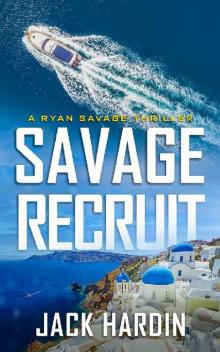 Savage Recruit (Ryan Savage Thriller Series Book 8)
Savage Recruit (Ryan Savage Thriller Series Book 8) Bitter Tide
Bitter Tide Vacant Shore
Vacant Shore Breakwater
Breakwater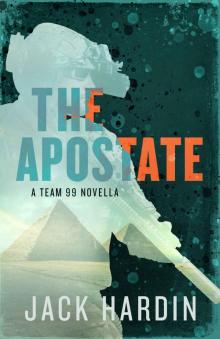 The Apostate
The Apostate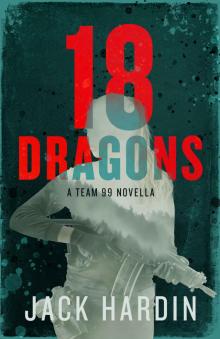 18 Dragons
18 Dragons Lonely Coast
Lonely Coast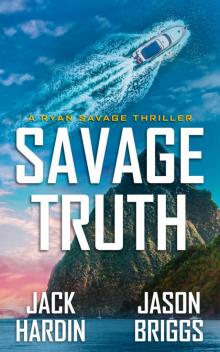 Savage Truth
Savage Truth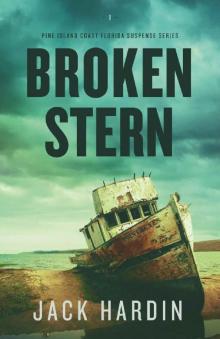 Broken Stern_An Ellie O'Conner Novel
Broken Stern_An Ellie O'Conner Novel Broken Stern: An Ellie O'Conner Novel (Pine Island Coast Florida Suspense Series) Book 1
Broken Stern: An Ellie O'Conner Novel (Pine Island Coast Florida Suspense Series) Book 1